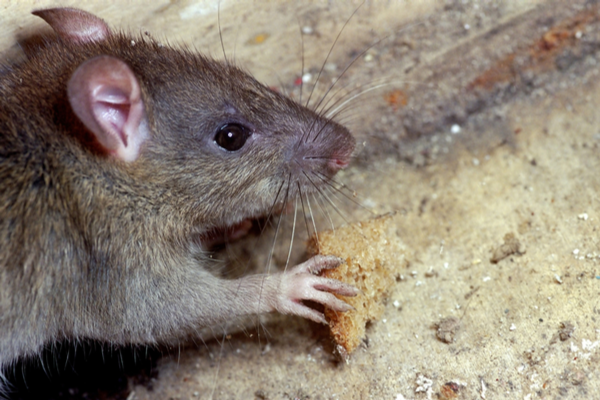Rats are omnivorous scavengers who will eat nearly whatever they can find. They’re particularly attracted to food sources they can rely on for extended periods of time without expending much effort. Outside, they eat berries, seeds, nuts, birdseed, and fallen fruits. Inside, they eat dry goods, pet food, and sugar.
When rats aren’t eating, they’re probably looking for food--especially if they’re concerned they can’t find enough. In fact, rats usually make their way into homes in order to capitalize on a particularly plentiful food source. If you can keep rats from finding the food near you, you’ll away their biggest motivation for infesting your home. Here’s what you should know to pull that off.
How do rats find food?
Rats don’t just have a powerful sense of smell, they actually perceive scent on a fundamentally different level. This is because, in addition to their noses, rats possess a second smell organ called the vomeronasal organ, or VNO. The VNO is a thin, ovular space within a rat’s nasal passage that detects species-specific pheromones.
The VNO gives rats the ability to smell and track scents with a greater degree of accuracy than is possible for most animals. They can smell and track other animals, know when other rats are living nearby, and, most importantly, track food through walls and other barriers. Along with smelling the food inside your home, rats can follow that smell inside as well.
How can I keep rats from looking for food in my home?
Unfortunately, this is actually quite difficult. Rat’s VNO gives them the ability to smell food through walls, pantry doors, and even packaging. If there’s food in your home, then rats can probably smell it and follow it. What you can do, however, is seal off food so rats know it won’t be easy to access.
Remember, rats are opportunists. They’re looking for an easy meal. Stopping rats from making their way inside your home is about making sure they can’t find that easy meal. Start by keeping any food you take outside in airtight, sealed garbage bags. Tie your cans and bins closed whenever you aren’t actively using them. Inside your home, repackage all of your pantry foods in airtight, hard plastic containers. Rats know they can’t break through hard containers, which will dissuade them from trying to access the food inside. When rats can’t access your food as easily as they’d like, they’ll look for food elsewhere instead.
How can I keep rats from getting food in my home?
For better or worse, this is the more achievable question. Rats may always be able to smell your food, but that doesn’t mean they’ll be able to get to it. Rats rely on several common “access points” to enter your home. They follow the scent of food wafting out until they find the gap where the air escaped your home. If the gap happens to be quarter-sized or wider, rats can slip through it easily.
The best way to keep rats out of your home is finding and sealing up these quarter-sized gaps. Start by resealing and weatherproofing exterior door and window frames seasonally. Then, look for gaps around areas where utility lines like plumbing pipes and electrical equipment enter your home. Seal these gaps with caulk or steel wool. Finally, seal up any cracks and holes in your baseboard and foundation. If they’re big enough to see, they’re probably big enough for rats to use.
Helpful as these tips seem, they won’t accomplish much if rats are already inside chowing down on your food. If you’re dealing with a rat infestation, call Plunkett’s for rodent control right away. We’ll figure out the best way to drive rats out and make sure they can’t bother you again.









